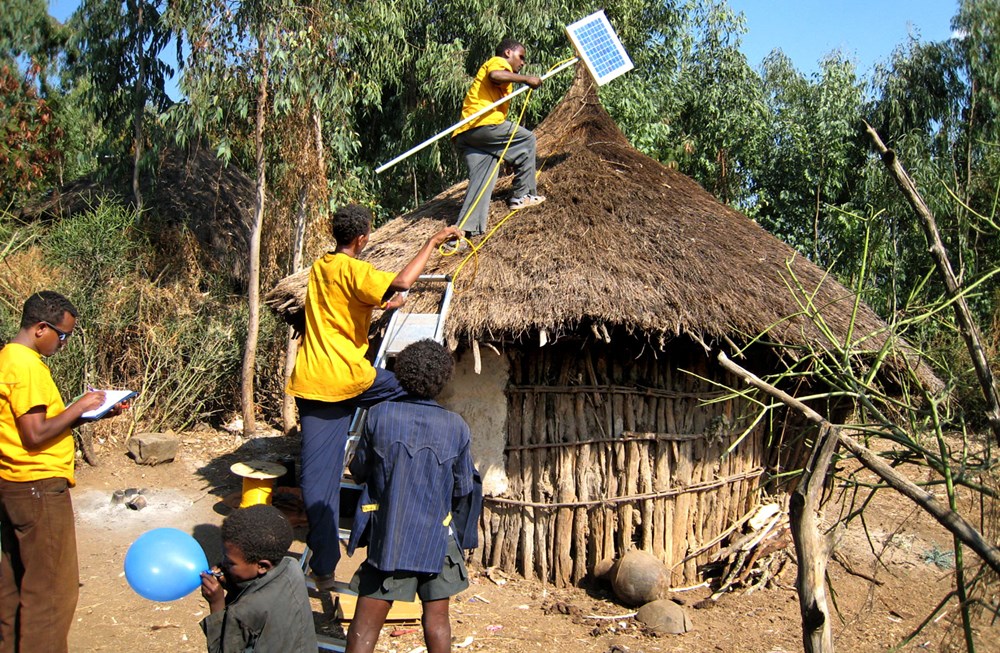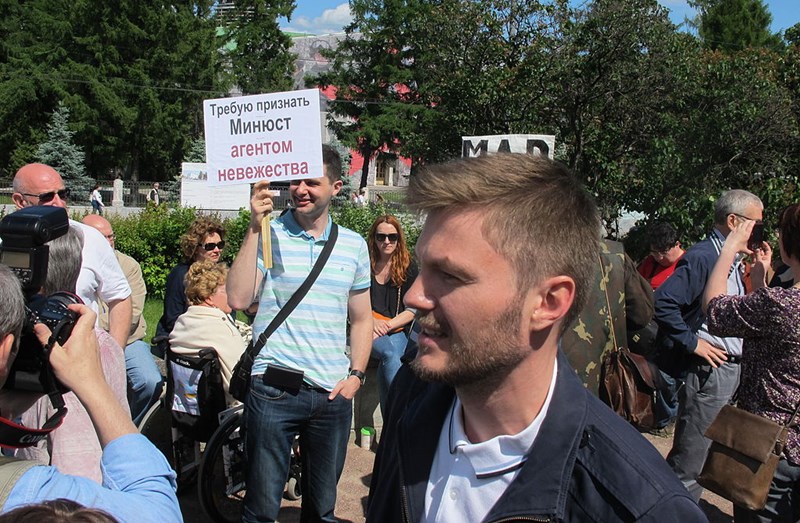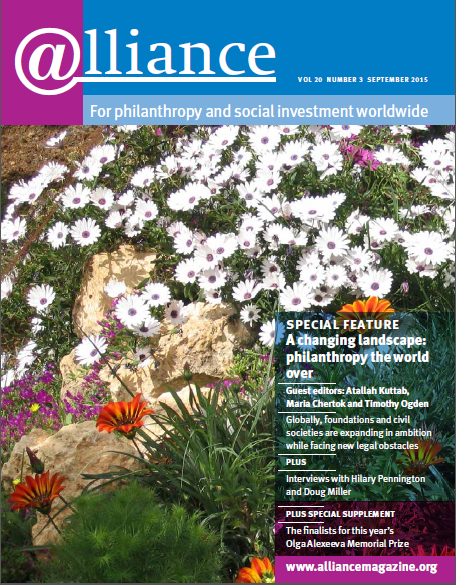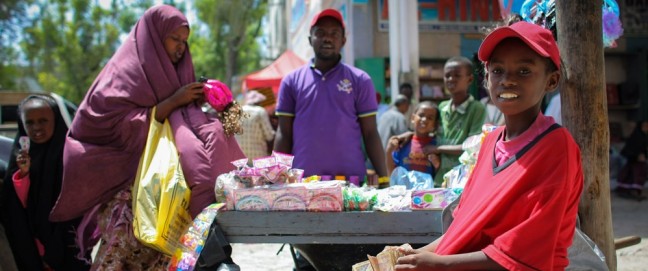Cross-border philanthropy is increasingly burdened in many parts of the world. In addition to existing constraints in dozens of countries, more than 30 countries have proposed or enacted such restrictions since 2012. This is the latest phase in an ‘associational counter-revolution’ that ICNL first noted in an Alliance magazine article in 2006.
In the past, some foundations viewed the law as a transactional challenge, which they could address by hiring a lawyer to draft grant agreements or craft work-around solutions. An increasing number of foundations now recognize that the law is a transformational challenge. To turn the tide, the philanthropic community must engage in advocacy and fund initiatives to help improve the legal environment for global philanthropy.
Laws are used to ‘defund’ and ‘delegitimize’ civil society
Some countries require prior approval to fund a civil society organization (CSO). Under Egyptian law, for example, a CSO must obtain the approval of the Ministry of Social Solidarity before receiving funds from any foreign source, including foreign foundations. Countries requiring prior approval of international funding transactions include Algeria, Azerbaijan, Bahrain, Bangladesh, Jordan and Uzbekistan.
Some countries take a slightly different approach, requiring government approval of organizations entitled to receive international funding. India is perhaps the best-known example: it requires recipient organizations to register under the Foreign Contribution (Regulation) Act.
Other countries require the foreign donor to sign an agreement or receive approval from the host government to fund an in-country CSO. This year, Azerbaijan enacted such legislation, and a draft law in China requires governmental approval for foreign donors to fund or carry out activities in China.
Governments are also using the law to stigmatize CSOs that receive international funding. Russia requires non-commercial organizations that receive funds from abroad and engage in ‘political activities’ to register as ‘foreign agents’. The ‘foreign agents’ label applies even if the use of international funding is unrelated to the ‘political activities’ of an organization. This label is particularly problematic because in Russian the term ‘foreign agent’ is synonymous with ‘foreign spy’. Kyrgyzstan is also considering a ‘foreign agents’ law. These laws are roughly modelled on the 1938 Foreign Agents Registration Act in the US.
Funding caps and routing rules
Ethiopia is a good example of the funding cap approach. Under a 2009 proclamation, ‘Ethiopian’ charities and societies can receive no more than 10 per cent of their total income from international sources. Only ‘Ethiopian’ charities and societies are legally allowed to work on disability rights, children’s rights, gender equality, conflict resolution, the efficiency of the justice system and other goals.
Another way of monitoring and controlling the flow of international funding to CSOs is to require organizations to route funding through a government body or ministry or a government-controlled bank. In practice, this approach gives governments discretion on whether to release the funds. Uganda and Uzbekistan are cases in point.
Yet another approach is to impose burdensome reporting requirements. Turkish law requires foundations to notify public authorities within one month of receiving international funding, and groups must provide notification before using the funds. The government of India ramped up enforcement of reporting requirements in the Foreign Contribution (Regulation) Act and recently proposed amendments that would impose additional reporting requirements on CSOs that receive international funding.
Outright bans and criminal sanctions bar philanthropic giving
Some countries explicitly prohibit international organizations from financing certain activities. In Sudan, for example, CSOs must seek approval from the Humanitarian Aid Commission (HAC) before receiving international funding. The HAC will grant approval only for CSOs that provide narrowly defined ‘humanitarian services’.
Another strategy is to tax international funding. This approach has been in place, at varying times, in Belarus, Kazakhstan and Turkmenistan.
Certain countries impose outright bans on funds from specific donors. For example, in May 2015 Russia enacted the Law on Undesirable Organizations, which prohibits Russian CSOs from receiving money from an organization deemed ‘undesirable’.
Burdening cross-border philanthropy in the name of counter-terrorism and anti-money laundering is another strategy, occurring in countries as diverse as the US, Azerbaijan and the British Virgin Islands. In Kosovo, the law prevents CSOs from receiving more than €1,000 from a single source in a single day without government permission.
Countries have used other laws, including criminal, defamation, tax and national security laws, to restrict global philanthropy. For example, in September 2014 Egypt amended its penal code to subject to life imprisonment anyone who receives funding or other support from an international source with the intent to ‘harm the national interest’, ‘compromise national sovereignty’ or ‘breach security or public peace’. The law also imposes life imprisonment on anyone who gives or offers such funding.
As an increasing number of countries are erecting barriers to cross-border philanthropy, it is time for the philanthropic community to address this troubling trend through advocacy and funding.
Douglas Rutzen is president and CEO of the International Center for Not-for-Profit Law (ICNL). Email drutzen@icnl.org
CHINA
Mark Sidel
Up to now, there have been relatively few legal restrictions on foreign funding in China. In recent years, the Chinese government has seemed increasingly interested in generally restricting and more significantly controlling foreign funding. Special attention has been given to foreign funding focused on more sensitive topics like advocacy, political pluralism and constitutionalism.
There is currently a draft law under discussion on the management of overseas NGOs and foundations that would put these organizations under public security (police) control and impose significant new registration requirements and other restrictions on them. This law will probably be enacted soon.
Assuming that this draft law is enacted, there will be both procedural and substantive restrictive impacts on a number of foreign funders. How far this will go is not clear at this point. Much will depend on implementation, but there is real and justifiable concern about the impact on foreign NGOs and funders in China.
A separate and important development, a new draft charity law would apply largely to domestic non-profit and charitable organizations. That has not been significantly opposed in the Chinese sector. It incorporates at least some of the reforms that have taken place in the Chinese non-profit sector in recent years, including more streamlined registration for some kinds of groups. That law will also affect and may limit the receipt and use of foreign funding through provisions on fundraising, foreign currency rules and bank accounts.
Mark Sidel is Doyle-Bascom Professor of Law, University of Wisconsin-Madison, and consultant (Asia), ICNL. Email mark.sidel@wisc.edu
EGYPT
Barbara Ibrahim
Until 2014, international organizations operating in Egypt were simply required to register with a ministry, although in some cases grants needed prior approval. Donor organizations sending funds from outside the country generally faced no direct restrictions; the onus was on Egyptian organizations receiving funds to report on and receive permission before accepting a grant.
Without public discussion, a presidential decree was issued in late 2014, mandating much stiffer penalties for cross-border funding that met certain vaguely worded criteria. Large fines and prison sentences up to life were introduced for anyone receiving or facilitating the delivery of a donation from a foreign entity that ‘harms the national interests’, ‘compromises national sovereignty’ or ‘breaches security or public peace’.
The stated purpose of the restrictions is to prevent terrorism, crime or foreign interference in politics. In practice, local entities and foreign funders working in development or humanitarian fields are rarely considered but Egyptian non-profits working in human rights, civic education or democracy promotion have for years been subject to restrictions on activities using the pretext of the foreign funding provisions.
The 2014 restrictions have had a further chilling effect on a sector already weak from years of harassment and restrictions. Some NGOs have closed or moved their operations out of the country. And the suspicion surrounding rights organizations is such that even local donors are reluctant to support their growth and development.
Governments have legitimate reasons to monitor and in some cases restrict foreign funding. Egypt faces an armed insurrection in the Sinai and heavily armed tribal militias and Islamist organizations operating in neighbouring Libya. However, the heavy-handed use of restrictions on foreign funding thwarts peaceful opposition groups and precisely those sectors of civil society necessary for a successful national transition. I see a worrying decline in the civic initiatives which proliferated in 2011 and 2012, especially among younger Egyptians. One immediate effect is that a growing number of civic innovators are avoiding the non-profit sector entirely in favour of social businesses that can operate in a freer climate.
Barbara Ibrahim is senior adviser to the president, American University in Cairo. Email bibrahim@aucegypt.edu
ETHIOPIA
Debebe Hailegebriel
The current regulatory regime has two main effects on Ethiopian NGOs working on human rights issues in general and specifically on gender equality, the rights of children and disabled persons, conflict resolution and efficiency of the justice sector. First, the bulk of rights-based work is reserved for Ethiopian charities and societies that raise less than 10 per cent of their funding from foreign sources. In effect, human rights organizations cannot receive foreign funding. This is particularly important in terms of the emergence, development and current profile of the Ethiopian civil society sector, which is highly dependent on foreign resources.
Second, under the Charities and Societies Agency (CSA) directives, a charity or society may engage only in income-generating activities that are directly related to its activity. Clearly, this further curtails access to funds for rights-based NGOs – what kind of business activity can be imagined directly related to the activities of a human rights organization? In addition, organizations are expected to show they have the initial capital to engage in income-generating activities, and fundraising from the public is possible only with written permission from the CSA. This is dependent on an NGO’s ability to demonstrate that this is the only means for the organization to carry out its activities, so permission may not be granted to organizations receiving funds from foreign sources.
The government argues that human rights-related activities are political activities, which should be conducted only by citizens using their own local funds. Foreign countries or agents should not be allowed to intervene in internal political affairs by providing funds to civil society organizations. Generally, the government wants CSOs to work on humanitarian and development-related issues, not human rights.
The upshot is that only a handful of independent human rights organizations remain, with very limited capacity to operate.
Debebe Hailegebriel is an independent legal consultant. Email debebehg@gmail.com

The Ethiopian government deems that foreign funding should only be used to finance development work, such as that done by the German Solar Energy Foundation.
INDIA
Ingrid Srinath
India’s Foreign Contribution Regulation Act (FCRA) 2010 classes all donations and fees and the interest accruing on such payments as foreign contributions. Companies with 50 per cent or more of their equity owned by foreign entities and diaspora Indians who are no longer citizens of India are also classified as foreign sources and may contribute only to NGOs with FCRA clearances. These clearances are granted for five years and are subject to stringent banking and reporting requirements. Foreign funds received by an organization registered under the FCRA may only be granted onward to other organizations that also have the requisite FCRA clearance. Indian non-profits cannot deploy their funds outside India’s borders, which constrains their ability both to address cross-border issues like trafficking and to play any wider regional role in South Asia.
‘The [Indian] government has just announced further proposed changes that media and lawyers.’
‘Organizations of a political nature’, an ill-defined category, are banned from receiving any foreign contribution. In the last few years, governments have used the FCRA provisions to curtail civil society activities in areas like environmental campaigning, support of minority or marginalized communities and political prisoners. There has also been a concerted campaign of disinformation and smears seeking to discredit foreign funding more generally.
The government has just announced further proposed changes that media and lawyers alike agree may well be unconstitutional. Among other things, these would require NGOs and other organizations that receive foreign donations to share personal details, bank account details and bio-data of their trustees with the government.
The restrictions mean that most funding is driven by business, especially in light of the new CSR legislation requiring all companies of a certain size to contribute 2 per cent of their average net income over the previous three-year period. The list of approved CSR activities under the new law and the natural reluctance of business to engage in ‘unpopular’ causes further limits support to such causes, while the bias towards business-driven philanthropy discourages non-profits from activities that might be perceived as hostile to business interests.
The combination of these factors with a corporatized media and continuing attempts to limit internet freedom means that Indian civil society could find itself entirely encircled by private interests and the governments they support.
Ingrid Srinath is CEO, Hivos India Advisory Services. Email ingrid.srinath@gmail.com
RUSSIA
Maria Chertok
The Foreign Agents Law, introduced in 2012, requires NGOs in receipt of foreign funding and engaged in ‘political activities’ to register as ‘foreign agents’. Political activities are very broadly defined and include interaction with government and influencing public opinion.
A couple of NGOs registered voluntarily, while nearly 80 have been added to the register by government in the last six months. Registered foreign agents include rights and advocacy groups, alongside sector resource centres and research organizations.
Recently, an Undesirable Organizations law has also been adopted, under which any foreign organization that could present a threat to national security and constitutional order could be labelled ‘undesirable’. Such organizations will be identified by the General Prosecutor’s office and their activities in Russia terminated, while those who continue to cooperate with them can be fined and even prosecuted.
The State Senate in July developed a ‘patriotic stop list’, which recommends bodies that might form part of an ‘undesirable organizations’ list. The ‘patriotic stop list’ includes the Mott Foundation, MacArthur Foundation, Open Society Institute, Freedom House, National Endowment for Democracy, National Democratic Institute and some others. The MacArthur Foundation has since closed its office in Moscow.

Moscow rally to support the Dynasty Science Foundation, termed a ‘foreign agent’ by government. Its assets were liquidated in July 2015.
A huge amount has been achieved over the last 25 years building a strong and vibrant civil society in Russia, which has grown at a remarkable rate. It is important to encourage that growth and continue to strengthen the vital work of civil society organizations in Russia.
Maria Chertok is director of CAF Russia. Email mchertok@cafrussia.ru













Comments (0)